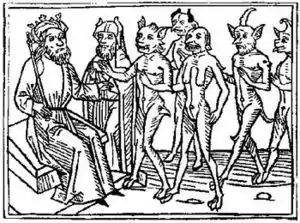Belial
Belial (İbranice: בְּלִיַעַל; bĕli-yaal), İbrani Kutsal Kitabı'nda bahsi geçen, daha sonra ise Musevi ve Hristiyan metinlerinde şeytan ile bağdaşlaştırılan bir terimdir.[1][2]

Etimoloji
Belial, "kötü ya da değersiz şeyleri karakterize etmek için kullanılan" İbranice bir kelimedir. Kelimenin etimolojik olarak genellikle beli- (בְּלִי; "olmamak") ve ya'al (יָעַל "değerinde") kelimelerinin birleşiminden türediği düşünülür.[3]
Dini metinlerde Belial
İbrani Kutsal Kitabı
Kelime, Masoretik Metin'de yirmi yedi kez geçmektedir.[4]
İbranice metinlerde ifade genellikle, "Belial'ın oğulları" olarak geçer. "Oğulları" ile biten ifadeler bir Sami deyimdir.[5] Bu 27 bahisten, "Belial'in oğulları" (בְּנֵֽי־בְלִיַּעַל beni beliyaal) deyimi, değersiz insanları belirtmek için 15 kez kullanılmıştır. Bu deyim genellikle putperestler, zinacılar ve İbrani Tanrısı'na baş kaldıranlar için kullanılmıştır. Metnin diğer dillere çevirisinde Belial yerine "değersiz insanlar" veya "aşağılık kişiler" gibi ifadeler kullanılmıştır
Ölü Deniz Yazmaları
Belial kelimesi, İkinci Tapınak döneminde Musevi metinlerinde sık görülen bir konsepttir.[3] 1948’de Kumran’da bulunmuş Ölü Deniz Yazmaları'nda da Belial’e yapılan çok sayıda atıfta bulunulmaktadır.
Ölü Deniz Yazmaları'nın Işığın Oğulları, Karanlığın Oğullarına Karşı[6] parçasına göre Belial, "Karanlığın Oğulları'nın" lideridir. Topluluğun Kuralları kısmında ise Tanrı'nın, “... Belial'i kalbimde tutmayacağım” demesi yer almaktadır. Ölü Deniz Yazmaları'nda Belial, Tanrı ile daha fazla tezatlık oluşturur. Metin Tanrıyı, Işık Meleği olarak tanımlarken, Karanlığın Meleği unvanı Belial'a atfedilir.
Hristiyanlık
Yeni Ahit'te kelime bir kez, Havari Pavlus'un bir sorusunda geçmektedir.
Rabbinik Yahudilik
Talmud ve rabbinik metinler genellikle, Belial'ı kötülüğün alegorik bir kişileştirmesi olduğunu düşünür ve doğaüstü olmayan bir görüşü takip eder. Tevrat'ta geçen "Belial'in oğulları" tabiri ise hala aynı anlamı ifade etmektedir.[7]
Kaynakça
- See the reference to "Beliar" in The Ascension of Isaiah, at EarlyChristianWritings.com 7 Kasım 2019 tarihinde Wayback Machine sitesinde arşivlendi., specifically at 1:8-9, 2:4, 3:11-13, 4:2, 4:14-18, 5:1, 5:15.
- Michael H. Floyd (2000). Minor Prophets: Volume 2, p 46. Nahum The eater of daughters. "In late biblical times beliya'al came to designate a mythic personification of evil, and Belial thus became the name of a satanic figure... Two considerations militate against this sort of reading, one historical and the other grammatical. First, the mythic personification of Belial appears to have been a rather late development, and there is no good reason to suppose that beliya'al had assumed this meaning by the time Nahum was composed. There is no evidence of a satanic figure named Belial in biblical or extrabiblical literature from earlier than the third century BCE (T. J. Lewis, "Belial," ABD 1 :655-56), and most scholars would date the final edition of .."
- Metzger & Coogan (1993) Oxford Companion to the Bible, p 77.
- The Epistles to the Corinthians [Gr. text] with notes and ... - Page 131 Arthur Penrhyn Stanley - 1855 "The fullest description of a man of Belial in the Old Testament is in Proverbs, vi. 12 – 15. : " A naughty person (' Adam Belial'), a wicked man, walketh with a froward mouth. [13] He winketh with his eyes, he speaketh with his feet, he teacheth with ..."
- Commentary on the New Testament use of the Old Testament Gregory K. Beale, D. A. Carson - 2007 "... "But as for you, come here, you sons of lawlessness Are you not children of destruction, a lawless seed?" Both phrases involve a Semitic idiom in which a generic personal noun ("son," "man," "master," etc.) followed by an adjectival genitive ..."
- 1QM, Col. XIII (=4Q495 2), 10-12
- The censor, the editor, and the text: the Catholic Church and the ... - Page 218 Amnon Raz-Krakotzkin - 2007 "Yosef Hacohen does not mention the issue of the printers but writes that the event happened as a result of informants who were "people, sons of Belial from our midst." See the summary in Heller, Printing of the Talmud, 156-63. 49."
